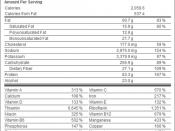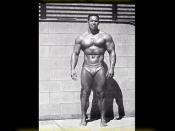This paper describes the Weight Watchers program and was used in SCI 160 - Introduction to LIfe Sciences. We were asked to write a paper on how taking this science class changed our daily personal diet and activity.
MY CURRENT DIET
Weight Watchers is a weight loss program that focuses on balanced low fat nutrition, exercise and group counseling, in which I started using back in February 2003. The diet that I am following is called the "Winning Points Plan." Every item of food from pizza to ice cream to carrots to bread has a points value based on its nutritional content. I can eat as I like as long as I stay within my daily allotment of points for specific foods. I am assisted by a points "calculator" and recipes provided by Weight Watchers. To assist me in my lifestyle changes, I am encouraged to attend group discussions and counseling sessions, mostly in person, at local Weight Watchers centers once a week.
THE BELIEFS OF WEIGHT WATCHERS
Weight Watchers believes that dieting is just one part of long-term weight management. A healthy body results from a healthy lifestyle -- which means mental, emotional, and physical health. Weight Watchers does not tell me what I can or can not eat -- they provide information, knowledge, tools and motivation to help me make the decisions that are right for myself about nutrition and exercise.
Weight Watchers helps me to make healthy eating decisions, and they encourage me to enjoy myself by becoming more active. They provide motivation, mutual support, and encouragement. Weight Watchers organizes group meetings around the world. Meeting other members often become meeting Leaders and Receptionists -- sharing the story of their personal success with others. Weight management is a partnership that combines their knowledge with my efforts.
THE WINNING POINT PLAN
All foods have a points value. How many points depend on the serving size, the number of calories, the amount of fiber grams, and the amount of fat grams in the food. Upon joining, I was given a book that tells the point values of most common foods, based on serving size. I also received a points finder, which is a pocket sized sliding gadget that figures out how many points a food has. Armed with the nutritional information on the packages of most foods, specifically the calories, fat grams, and fiber grams, the calculator quickly and easily tells me how many points that in that food. The higher the fat grams, the more points that are in that food. The higher the fiber grams, the less points.
The ultimate effect is that I learned to eat healthier. It has reinforced what I already knew - that a high fiber, low-fat diet is the healthiest way to lose weight. Each week, I am given a form to write down everything I eat, and how many points it has. If I know I am going out for a nice dinner, I will use less of my points earlier in the day, so that I can "bank" some of my points for later. I have learned that certain foods that I really enjoy, such as popcorn, is a filling and delicious afternoon or evening snack that only has one point for a five cup serving. I buy the microwave 94% fat-free type and spray it with "I Can't Believe its not Butter". I also like the Weight Watchers frozen éclair or ice cream sandwiches, each with three points. Jell-O makes a small cup of fat-free pudding, which is only one point. During the day, I eat lots of fruits, most of which only have two points.
The amount of points each individual should have daily is based on the person's body weight, and how much he or she is trying to lose. The individual decides how he or she wants to allocate those points. In my case, I am trying to lose a total of thirty six pounds, I have lost a total of 27 pounds since I have started. I am supposed to stay within the twenty two to twenty five point range, staying closer to the higher number and never going under the lower number.
It is also important to the program to have from six to eight glasses of water a day. I have found that not only is it filling, but it keeps my body hydrated. Before I began this program, I never drank even close to this amount, but since I have begun to do this, I feel much better.
At each meeting, I weigh in first, and any weight changes are noted on my card. Then the lecturer gives support and ideas for strategies to help us stay on the program successfully. She offers suggestions for alternative lower points foods to eat, and ways to survive in the workplace or at a party without going over your points for the day.
In my case, believe it or not, before I joined, I actually was not eating enough. I always skipped breakfast and had a tiny lunch, but would eat a fattening couple of cookies in the afternoon or often after dinner. I would pop a few small candies during the day and loved white bread. Since I would often go four or five hours before I ate, my body was almost in starvation mode, with my metabolism slowed to a crawl. Then when I ate something fattening, it would turn to sugar and get stored as fat.
It is important to stay within the range of points, always having your minimum number of points to keep your metabolism fueled while losing weight at a safe rate. This is not a typical yo-yo diet, with giant weight losses, but rather a healthy way to eat and hopefully a permanent way to view food in a sensible manner, while losing weight slowly.
WINNING POINTS
Winning Points from Weight Watchers is designed to make me feel more satisfied while I am losing weight. I can eat the foods I love and still lose weight. I also get the right mix of carbs and protein to keep me satisfied. Winning Points is all about me -- personalize it to suit my tastes and lifestyle. I actually came up with a little motto: "2003 is all about me."
HOW I FEEL ABOUT THE PROGRAM
The program makes plenty of room for eating normal foods - portion control is the key. I can go to restaurants or to a dinner at someone's house. When I announced I was on Weight Watchers to my coworkers, they were surprised that I could "eat anything," but in moderation.
I feel that this is a well-researched program. Physicians and dieticians designed the program. They are always learning new things. As an example of how the program has changed (I'm a 2nd generation Weight Watcher), my mother used to have to weigh and measure everything she ate, and had to have a serving of liver once per week. It was the early 1980's, and Weight Watchers was then a very strict program that did not fit into everyday eating - my mother would prepare something for herself that was different than what the rest of the family ate. Today, the program allows all foods and drinks and offers solutions and support for eating out. I even have a dining out guide for many chain restaurants.
CONCLUSION
Unfortunately, this nutrition class has not changed my personal diet but I have started to take a multi-vitamin every morning along with a glass of Orange Juice. Based on the vitamin and mineral presentations from this nutrition class I realized that no matter how well I am eating not all the foods that I am consuming carry the vitamins and minerals that I need on a daily basis. Therefore, I am trying to make up for the doses I am missing out on.


